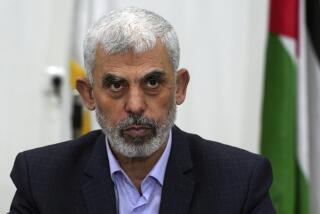Palestinians pick a new prime minister
- Share via
JERUSALEM — Rival Palestinian factions reported tentative agreement Monday to name a U.S.-educated scientist as prime minister of a unity government that they hope will persuade Western governments to restore assistance.
Mohammed Shabir, a former university president with no political affiliation, emerged as the likely leader of a new ruling coalition during talks between the governing Hamas movement and the Fatah party it defeated at the polls in January.
The two factions have been negotiating for months under pressure of sanctions that have left the government barely able to function or pay its 165,000 employees, causing widespread hardships in the West Bank and Gaza Strip.
The United States and European Union cut off aid because Hamas, an Islamic militant movement they consider a terrorist organization, took power without dropping its refusal to recognize Israel.
Israel is boycotting the Hamas government by withholding tax revenue it had collected for the Palestinian Authority.
Shabir, 60, holds a doctorate in microbiology from West Virginia University. He is an Islamist considered to be close to Hamas but had good relations with all factions during his 15 years as head of Gaza’s Islamic University. He rarely speaks in public about Israel, leaving his views on the Israeli-Palestinian conflict largely unknown.
Officials of Hamas and Fatah emphasized that Shabir’s nomination was not official and depended on further talks on the makeup of the Cabinet.
The arrangement also appears to hinge on acceptance of the new government by the West and a prisoner release agreement between Hamas and Israel.
Palestinian Authority President Mahmoud Abbas, who leads Fatah, and Prime Minister Ismail Haniyeh, a senior figure in Hamas, first agreed in September to form a unity government made up of technocrats from outside their parties’ ranks. But negotiations stalled, and fighting erupted between armed Fatah and Hamas groups.
The two men revived their pact last week. In a speech Friday, Haniyeh announced that he was willing to step down if that would end the Palestinians’ isolation.
The tentative agreement on a new prime minister was the first step toward that end. It was reported to the Associated Press by Mousa abu Marzouk, a top official at Hamas’ headquarters in Syria, and confirmed by aides to Abbas.
A new government would not strip Abbas of the presidency, to which he was elected in January 2005 after the death of longtime leader Yasser Arafat. Their Fatah movement dominated Palestinian politics for decades.
It would be up to Abbas to nominate a new prime minister, and aides said he was unlikely to do so until the two factions agreed on a Cabinet.
Hamas would name most of the ministers; Fatah and smaller parties would also be represented, in rough proportion to the votes they polled in January.
Officials of the two biggest factions said Salam Fayyad, a respected economist credited with fighting corruption as finance minister in the Fatah government, was likely to return to that post. Ziad abu Amr, an independent lawmaker who has mediated between Fatah and Hamas, is the leading candidate to become foreign minister, the officials said.
Abbas said last week that he hoped to name a new government by the end of the month. It would deal only with domestic Palestinian affairs, giving Abbas a mandate to seek a resumption of peace talks with Israel.
U.S. and Israeli officials said Monday that easing the Palestinians’ isolation would depend on the new government’s policies, not on who was in it. Israel has refused to talk to any Palestinian government that does not accept three principles listed by the United States and European Union for ending sanctions: recognition of Israel, renunciation of violence and acceptance of previous Arab-Israeli peace agreements.
“The issue is not who is sitting in the government but what the government says,” Israeli Foreign Minister Tzipi Livni told Israel Radio on Monday.
Officials involved in the unity talks have said the government would be vague on the three principles. But aides to Abbas say he has private assurances from Western leaders that the sanctions would not be applied to a new, nonpartisan Palestinian leadership.
Hamas had insisted on such assurances as a condition for leaving the government. In return, Abbas has said that Hamas must conclude a prisoner release deal with Israel, allowing an Israeli soldier captured in June to go home.
*
More to Read
Sign up for Essential California
The most important California stories and recommendations in your inbox every morning.
You may occasionally receive promotional content from the Los Angeles Times.










